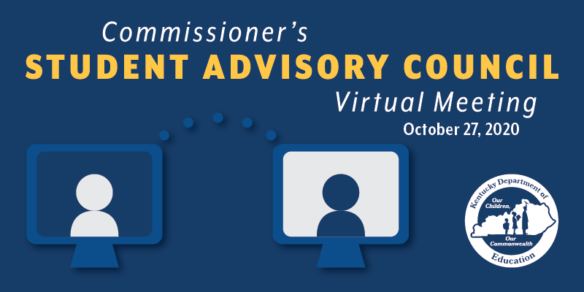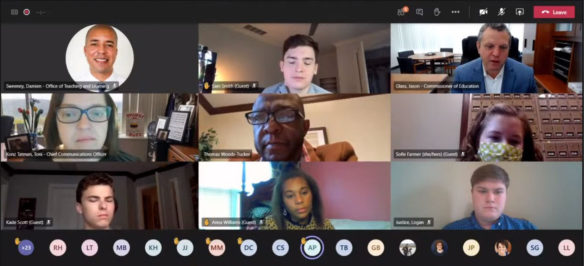
- Asked what his first steps will be surrounding equity and anti-racism in Kentucky’s schools, Thomas Woods-Tucker said he will begin by examining how schools currently are addressing these issues.
- Damien Sweeney, KDE’s program coordinator for comprehensive school counseling, discussed various coping strategies with the council and talked about the importance of normalizing stress and anxiety.
By Jacob Perkins
Jacob.perkins@education.ky.gov
The Kentucky Department of Education’s (KDE) Commissioner’s Student Advisory Council spent the majority of its Oct. 27 virtual meeting getting to know Thomas Woods-Tucker, KDE’s first chief equity officer and the new deputy commissioner of the Office of Teaching and Learning (OTL).
Education Commissioner Jason E. Glass announced the hiring of Woods-Tucker on Oct. 14.
For more about Woods-Tucker and his background, read his profile on Kentucky Teacher.
Asked what his first steps will be surrounding equity and anti-racism in Kentucky’s schools, Woods-Tucker said he will begin by examining how schools currently are addressing these issues.
“I am certain there are some great things already happening in the school system,” he said. “Then I will look at some of the best practices across the country and listen to the great ideas from our students and staff.”
Woods-Tucker believes the groundwork for change in the Commonwealth’s schools already has been laid through the Kentucky Board of Education’s resolution affirming its commitment to racial equity in Kentucky public schools.
“I think that is where it starts,” he said. “Then we need to ensure that we are living out that creed in our public school system. …
“I still believe, and I hold in my heart, our best vehicle for eradicating inequalities and racism is a strong public education system.”
Sofie Farmer, a senior from the Gatton Academy, asked Woods-Tucker how he will ensure the department is focused on historically accurate curriculum as deputy commissioner of OTL.
Through his two roles at KDE, Woods-Tucker said he and his team will be able to look at curriculum through an equity lens to make sure all Kentucky students see their experiences reflected in the material they are taught.
Anna Williams, a senior at Anderson County High School, said she has made an effort to be involved in various academic and leadership activities through her school as a way to show her community that minority students are capable of using their voice.
Now that she is learning from home through virtual instruction, she asked Woods-Tucker for advice on what she can do to continue to highlight equity within her school.
“Anna, you’re doing the first and most important thing – you’re not on the sideline. You are actively engaged,” Woods-Tucker said. “Even though we are in this era of COVID … you are actively having a voice to help shape the present and future learning experience for young folks and our staff members in the Commonwealth of Kentucky.”
Woods-Tucker commended all of the council members for making sure their voices were being heard and added that it is important for the students to hold their peers and school community accountable to ensure equity is being met.
“That’s tough work,” he said. “It’s tough holding people accountable, but it starts with holding yourself accountable.”
A couple of the students expressed concerns about racist comments being made by other students, and in one case, by a teacher.
Kade Scott, a senior from Floyd Central High School (Floyd County), said it was easier to confront the individuals making racist comments when they occurred during in-person instruction. However, discussions have been much less beneficial and much more divisive since the transition to online learning, he said.
Woods-Tucker said students and staff must fearlessly address these issues in a non-confrontational manner.
“If you don’t confront bullying, if you don’t confront sexism and racism, it will continue to permeate your society and your school,” he said. “It starts with everyone in your school creating a culture, and buying into the culture, that that is not going to be tolerated.”

Thomas Woods-Tucker, center, the Kentucky Department of Education’s first chief equity officer and the new deputy commissioner of the Office of Teaching and Learning, was introduced to the Commissioner’s Student Advisory Council at it’s Oct. 27 meeting.
Screen shot by Toni Konz Tatman
Todd Allen, KDE’s general counsel, explained to the council that all teachers in Kentucky public schools are required to have a certificate, which is their license to be a teacher. The Education Professional Standards Board (EPSB) issues these certificated to teachers. EPSB also is the entity that is responsible for ensuring teachers comply with the code of ethics.
While superintendents in every school district have a duty to report to EPSB anytime they have reason to suspect a teacher has violated the code of ethics, the EPSB also accepts complaints from community members such as parents, students, certified educators and classified staff.
More information on how to file a complaint can be found on EPSB’s website.
Mental Health
During its previous meeting, members of the student advisory council said students in the Commonwealth needed coping strategies, especially when dealing with the trauma brought on from the pandemic.
Damien Sweeney, KDE’s program coordinator for comprehensive school counseling, discussed various coping strategies and talked about the importance of normalizing stress and anxiety.
“It’s easy for us to try and create the perfect image and to show the world that we are all well and everything is just fine, but we know that most of us are under a lot of stress right now and that stress creates a lot of anxiety,” he said.
During a mental health check-in, Sweeney asked the students to anonymously discuss things that they are excited or worried about right now.
A few of the students expressed excitement for sports and to safely see their friends this Halloween. Others said they are feeling worried about college applications and even felt concerns over their parents’ jobs.
The students said these regular anonymous check-ins and keeping in contact with one another have been vital for their mental health.
“We really have to find ways to connect personally,” Sweeney said. “When we connect personally, that’s when we’re able to produce our best stuff.”
World Language Standards
The virtual meeting concluded with an update from OTL on the Kentucky Academic Standards for World Language.
According to Krista Hall, director of KDE’s Division of Program Standards, the department has had world language teachers from across the state meet for the better part of a year to work on revising the current world language standards.
After developing the standards document, the teachers drafted a vision statement to guide their work. The following statements are included in their vision:
- Provide equitable opportunities and capabilities to use language and cultural knowledge to make friendships, develop and grow, and to hone the skills necessary to become successful global citizens;
- Ensure a rich exposure and understanding of people, places and practices of the target culture, in turn enabling learners to reflect on these aspects of their own culture;
- Empower students to become individuals who are inquirers, empathetic, risk-takers, reflective and good communicators; and
- Intentionally push the focus of culture to the core of the language learning experiences. The global competencies are highlighted in more detail, and sample topics related to equity are specifically included in the sample learning targets.
Loren Little, a sophomore at Clinton County High School, said she agrees with the vision established by the writing team, though she feels more emphasis should be put on learning other cultures as a way to better reflect on our own.
“I also believe that learning about other cultures would help people to connect with them more and would cause a decline in racism or harassment of other minorities,” she said.
Council member Drake Calhoon, a sophomore from Calloway County High School, loved that the vision includes empowering students.
“I believe we can always expand on educating students on different cultures,” she said. “World language goes beyond the phonics and grammar, and I think elevating the multifaceted cultures around the world is important.”
The Commissioner’s Student Advisory Council will meet again on Dec. 8.



Leave A Comment